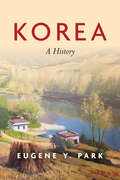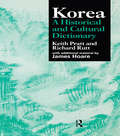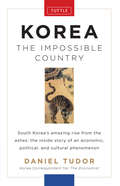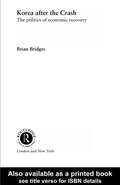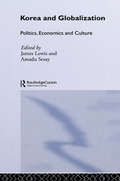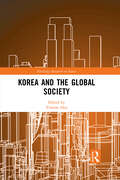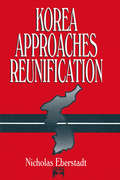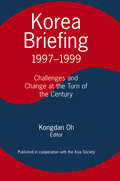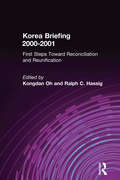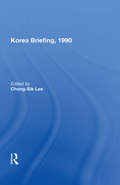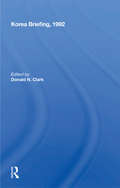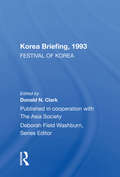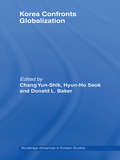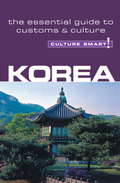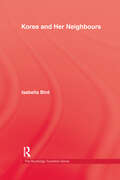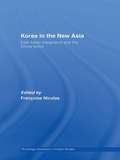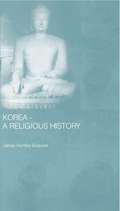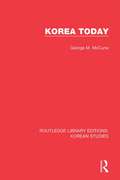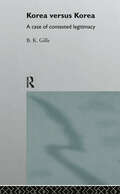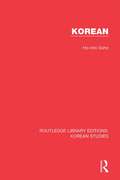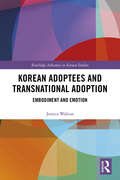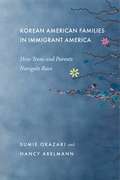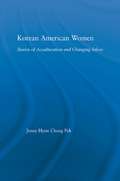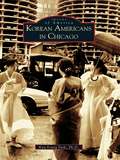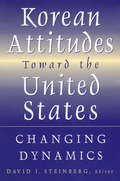- Table View
- List View
Korea: A History
by Eugene Y. ParkWhile popular trends, cuisine, and long-standing political tension have made Korea familiar in some ways to a vast English-speaking world, its recorded history of some two millennia remains unfamiliar to most. Korea: A History addresses general readers, providing an up-to-date, accessible overview of Korean history from antiquity to the present. Eugene Y. Park draws on original-language sources and the up-to-date synthesis of East Asian and Western-language scholarship to provide an insightful account. This book expands still-limited English-language discussions on pre-modern Korea, offering rigorous and compelling analyses of Korea's modernization while discussing daily life, ethnic minorities, LGBTQ history, and North Korean history not always included in Korea surveys. Overall, Park is able to break new ground on questions and debates that have been central to the field of Korean studies since its inception.
Korea: A Historical and Cultural Dictionary (Durham East Asia Series #111)
by Keith Pratt Richard RuttCompiled by specialists from the University of Durham Department of East Asian Studies, this new reference work contains approximately 1500 entries covering Korean civilisation from early times to the present day. Subjects include history, politics, art, archaeology, literature, etc. The Dictionary is intended for students, teachers and researchers, and will also be of interest to the general reader. Entries provide factual information and contain suggestions for further reading. A name index and comprehensive cross-reference system make this an easy to use, multi-purpose guide for the student of Korea in the broadest sense.
Korea: The Impossible Country
by Daniel Tudor[Long overshadowed by Japan and China, South Korea is a small country that happens to be one of the great national success stories of the postwar period. From a failed state with no democratic tradition, ruined and partitioned by war, and sapped by a half-century of colonial rule, South Korea transformed itself in just fifty years into an economic powerhouse and a democracy that serves as a model for other countries. With no natural resources and a tradition of authoritarian rule, Korea managed to accomplish a second Asian miracle.Daniel Tudor is a journalist who has lived in and written about Korea for almost a decade. In Korea: The Impossible Country, Tudor examines Korea's cultural foundations; the Korean character; the public sphere in politics, business, and the workplace as well as the family, dating, and marriage. In doing so, he touches on topics as diverse as shamanism, clan-ism, the dilemma posed by North Korea, the myths about doing business in Korea, the Koreans' renowned hard-partying ethos, and why the infatuation with learning English is now causing huge social problems.]South Korea has undergone two miracles at once: economic development and complete democratization. The question now is, will it become as some see Japan, a rich yet aging society, devoid of energy and momentum? Or will the dynamism of Korean society and its willingness to change-as well as the opportunity it has now to welcome outsiders into its fold-enable it to experience a third miracle that will propel it into the ranks of the world's leading nations in terms of human culture, democracy, and wealth?
Korea after the Crash: The Politics of Economic Recovery (Politics in Asia)
by Brian BridgesBrian Bridges examines the impact on South Korea of the financial crisis of 1997. Covering events up to and including the recent parliamentary elections in South Korea, the book considers the socio-economic and political implications of the financial crisis. It is invaluable reading for students of modern Korea.
Korea and Globalization: Politics, Economics and Culture
by James Lewis Amadu SesayKorea faces two challenges in the twenty-first century: unification and globalization. Both entail problems of economic, political and cultural integration. In the past, Koreans successfully 'unified' in various forms, and 'globalized' in many ways. This book is a study of the theme of globalization, addressing various aspects of Korea's integration into the global community from a social scientific or humanistic perspective. This investigation begins with a focus on contemporary South and North Korea: the 'globalized' southern daily life, South Korean labour as a global player, the southern development state, and the cultural division that poses the greatest threat to reunification. Moving outwards in concentric circles, chapters address Korea's connections with its region and Koreans' contributions to the wider world. Relations with Japan, Korea's most difficult bi-lateral relationship, are surveyed to identify both patterns and images. The thirteenth century Tripitaka Koreana is the most complete collection of Buddhist scripture in Chinese and its recent digitization points towards a renaissance of this world religion. South Korea's pursuit of a Nobel Prize in Literature is put in perspective when one considers Korean contribution to the pre-modern Sinitic literary world. South Korea may owe its existence to the United Nations, but since entering the UN in 1991, it has taken to heart the altruistic urge of global peacekeeping.
Korea and the Global Society (Routledge Research on Korea)
by Yonson AhnThis book explores multiple fields and disciplines around the theme of South Korea’s engagement and exchanges with global society focusing on development cooperation, migration and the media. The core of this volume is an analysis of South Korea’s engagement and reciprocity in global society that has developed out of the country’s shift from aid recipient and migrant sender to aid provider and migrant host. The contributions approach this through the three main aspects of overseas aid, cross-border contacts, and interplay of identities in the mediascape. These themes represent an interdisciplinary array of research that introduces and analyses interconnected and concurrent instances of reciprocity, convergence, tension, inclusion, or exclusion in navigating South Korea’s interactional relations with global society, spanning regions and countries including Africa, Asia, the USA, and Germany. This book will be valuable reading to students and researchers from a wide range of disciplines including sociology, gender studies, ethnic studies, media studies, IR, and area studies, in particular Korean studies.
Korea Approaches Reunification
by Nicholas EberstadtThis work presents a detailed picture of the divergent socio-economic trends in divided Korea since its 1945 partition. It also covers the social and political situation in the North and South today, and the domestic and international challenges to a successful Korean reunification.
Korea Briefing: 1997-1999: Challenges and Changes at the Turn of the Century (Asia Society Briefings Ser.)
by Kongdan Oh Ralph C. HassigWhile mainly focusing on the Kim Dae Jung era, the essays in this book examine persistent problems and new opportunities in Korean politics, economy, and culture. In 1997, Kim Ae Jung was elected to head the government of the Seventh Republic, after 30 years in opposition.
Korea Briefing: 2000-2001: First Steps Toward Reconciliation and Reunification (Asia Society Briefings Ser.)
by Kongdan Oh Ralph C. HassigThis new edition of Korea Briefing provides a timely analysis of the evolving relationship between South and North Korea. In June 2000, after years of ignoring the South Korean government, the North Korean leader Kim Jong II finally agreed to a summit meeting with South Korea's President Kim Dae Jung. As a sign of reconciliation, the summit meeting has prompted Korea and its neighbors to rethink the assumptions of the Cold War era. With contributions by a multi-national panel of Koreanexperts, the book discusses a wide range of topics, including South Korean politics and economy; Korea's relations with its neighbors and with the United States; recent changes in North Korea; the fate of North Korean defectors; and lessons in German reunification for the two Koreas. The discussions are supplemented by a glossary, a chronology of events occurring from June 1999 to June 2001, and a bibliography.
Korea Briefing, 1990
by Chong-Sik LeeThis book initiates a series of comprehensive annual reviews of issues and events in the Republic of Korea and on the peninsula as a whole in 1990. It provides both students and specialist with a useful overview of a rapidly changing society.
Korea Briefing, 1992
by Donald N. Clark Deborah Field WashburnIn this third annual volume in the Korea Briefing series, experts analyze key aspects of contemporary Korean society. Included this year is an in-depth assessment of North Korea as well as chapters on politics, economics, women's issues, security on the Korean peninsula, and the development of the Korean press.
Korea Briefing, 1993: Festival Of Korea Edition
by Donald N. ClarkThis edition of Korea Briefing, the fourth in the series, is issued in conjunction with The Asia Society's Festival of Korea, a yearlong, nationwide celebration of Korean history, culture, and contemporary life.
Korea Confronts Globalization (Routledge Advances in Korean Studies)
by Chang Yun-Shik Hyun-Ho Seok Donald L. BakerKorea Confronts Globalization looks at the way in which the phenomenon of globalization has impacted on Korean society in terms of national identity, corporate change, labour markets, democracy, tradition and social policy, and the implications for Korea's social cohesion in a continually globalizing world. While becoming more open to the outside world, South Korea has remained a cohesive national community with a strong nationalist reaction against the globalization of Korea and with Koreans constantly reminding themselves of the need to retain their national identity. They have also learned to cope with various forms of conflict arising from diversified interests in a complex society and the South Korean government is now making a serious attempt to establish a welfare state with various schemes designed to help the poor and needy to maintain a minimum level of ‘decent’ living. But it is uncertain whether South Korean society will continue to remain cohesive. Social inequality is increasing and the class divisions appear to be hardening and as such can Korea remain cohesive? As a volume looking at the political and social implications of globalization in modern South Korea, this book will be of great interest to students and scholars of Korean and East Asian studies, comparative sociology, development studies and politics
Korea - Culture Smart!
by James HoareCulture Smart! provides essential information on attitudes, beliefs and behavior in different countries, ensuring that you arrive at your destination aware of basic manners, common courtesies, and sensitive issues. These concise guides tell you what to expect, how to behave, and how to establish a rapport with your hosts. This inside knowledge will enable you to steer clear of embarrassing gaffes and mistakes, feel confident in unfamiliar situations, and develop trust, friendships, and successful business relationships.Culture Smart! offers illuminating insights into the culture and society of a particular country. It will help you to turn your visit-whether on business or for pleasure-into a memorable and enriching experience. Contents include* customs, values, and traditions* historical, religious, and political background* life at home* leisure, social, and cultural life* eating and drinking* do's, don'ts, and taboos* business practices* communication, spoken and unspoken"Culture Smart has come to the rescue of hapless travellers." Sunday Times Travel"... the perfect introduction to the weird, wonderful and downright odd quirks and customs of various countries." Global Travel"...full of fascinating-as well as common-sense-tips to help you avoid embarrassing faux pas." Observer"...as useful as they are entertaining." Easyjet Magazine"...offer glimpses into the psyche of a faraway world." New York Times
Korea & Her Neighbours Hb: A Narrative Of Travel, With An Account Of The Vicissitudes And Position Of The Country, Volume 1 - Primary Source Edition
by BirdFirst published in 2003. Routledge is an imprint of Taylor & Francis, an informa company.
Korea in the New Asia: East Asian Integration and the China Factor (Routledge Advances in Korean Studies)
by Françoise NicolasSince the late 1970s a number of regional developments have impacted upon South Korea’s political and economic standing in Asia. China’s spectacular growth and closer integration with its neighbouring economies, along with a tendency toward more assertive political and diplomatic activity, have deeply altered both the economic and political East Asian environment. Simultaneously, the 1997-98 financial crisis catalysed a process of increased regional co-operation in East Asia. China’s rise has imposed a leadership problem that may constitute a major obstacle on the road to deeper regional integration, as well as add force to the need for collective action, and it is this paradox that may give South Korea a key role in the reorganization of the region. Moreover, inter-Korean relations and Korea’s future security environment may also feel the effects of the rise of China. Korea in the New Asia seeks to analyze to what extent and how South Korea may contribute to, and take advantage of, the new regional configuration in East Asia. The book represents the first study to address Korea’s regional policy responses to the rise of China as an economic power and the regional economic integration of East Asia. Written by an international team of experts, this multidisciplinary study will appeal to researchers, academics and students with an interest in international relations, security studies, economics and East Asian politics. .
Korea - A Religious History
by James H. GraysonThis is an historical survey of all the religious traditions of Korea in relation to the socio-cultural trends of seven different periods of Korean history. The book includes a discussion of the history of the study of religion in Korea, a chronological description of Korean folk religion including shamanism, Buddhism, Confucianism, Roman Catholicism and Protestantism, Islam, and Korean New Religions, and some final observations about the unique characteristics of religious beliefs and practices in Korea.
Korea Today (Routledge Library Editions: Korean Studies #3)
by George M. McCuneThis book, first published in 1950, was the first comprehensive study of post-War Korea after its liberation and division. It provides an analysis of the American and Russian military occupations, the efforts of the United Nations to deal with the problem of unification of the country, the political and economic policies followed by the northern and southern regimes, and an appraisal of the US programme of economic and military aid to South Korea.
Korea versus Korea: A Case of Contested Legitimacy (Politics in Asia)
by Barry GillsThis study traces the historic course of diplomatic competition between the rival Koreas within the context of a changing international system. This innovative analysis focuses on the dynamic interaction of domestic and international political economies and their effects on the conduct of diplomacy. The result is a new interpretation of the importance of adaptability in determining success in international relations.
Korean (Routledge Library Editions: Korean Studies #4)
by Ho-min SohnThis work, first published in 1994, provides a framework which covers the major aspects of contemporary standard Korean and allows cross-language comparisons. It offers a wide-ranging and comprehensive grammatical description of Korean, covering syntax, morphology, phonology, ideophone/interjections and lexicon.
Korean Adoptees and Transnational Adoption: Embodiment and Emotion (Routledge Advances in Korean Studies)
by Jessica WaltonThis book investigates the experiences of South Koreans adopted into Western families and the complexity of what it means to "feel identity" beyond what is written in official adoption files. Korean Adoptees and Transnational Adoption is based on ethnographic fieldwork in South Korea and interviews with adult Korean adoptees from the United States, Australia, Canada, Switzerland and Sweden. It seeks to probe beneath the surface of what is "known" and examines identity as an embodied process of making that which is "unknown" into something that can be meaningfully grasped and felt. Furthermore, drawing on the author’s own experiences as a transnational, transracial Korean adoptee, this book analyses the racial and cultural negotiations of "whiteness" and "Korean-ness" in the lives of adoptees and the blurriness which results in-between. Highlighting the role of memory and the body in the formation of identities, this book will be useful to students and scholars of Korean Studies, Ethnicity Studies and Anthropology as well as Asian culture and society more generally.
Korean American Families in Immigrant America: How Teens and Parents Navigate Race
by Sumie Okazaki Nancy AbelmannAn engaging ethnography of Korean American immigrant families navigating the United States Both scholarship and popular culture on Asian American immigrant families have long focused on intergenerational cultural conflict and stereotypes about “tiger mothers” and “model minority” students. This book turns the tables on the conventional imagination of the Asian American immigrant family, arguing that, in fact, families are often on the same page about the challenges and difficulties navigating the U.S.’s racialized landscape. The book draws on a survey with over 200 Korean American teens and over one hundred parents to provide context, then focusing on the stories of five families with young adults in order to go in-depth, and shed light on today’s dynamics in these families. The book argues that Korean American immigrant parents and their children today are thinking in shifting ways about how each member of the family can best succeed in the U.S. Rather than being marked by a generational division of Korean vs. American, these families struggle to cope with an American society in which each of their lives are shaped by racism, discrimination, and gender. Thus, the foremost goal in the minds of most parents is to prepare their children to succeed by instilling protective character traits. The authors show that Asian American—and particularly Korean American—family life is constantly shifting as children and parents strive to accommodate each other, even as they forge their own paths toward healthy and satisfying American lives.This book contributes a rare ethnography of family life, following them through the transition from teenagers into young adults, to a field that has largely considered the immigrant and second generation in isolation from one another. Combining qualitative and quantitative methods and focusing on both generations, this book makes the case for delving more deeply into the ideas of immigrant parents and their teens about raising children and growing up in America – ideas that defy easy classification as “Korean” or “American.”
Korean American Women: Stories of Acculturation and Changing Selves (Studies in Asian Americans)
by Jenny PakCurrent models of acculturation in multicultural counseling literature are severely limited in describing how individuals deal with the complexity of culture change. The reasons for immigration, the historical period during which the immigration occurred, educational and socioeconomic levels, ethnic community and religious involvements, family functioning, and social support, to name a few, all have an impact in the process of cultural adaptation. This book examines Korean American women's dual-cultural identity. By utilizing multiple case studies, the book highlights: (1) the complexity of issues involved as individuals go through different levels of culture change, and (2) the multiplicity of people negotiating their lives in the dual-cultural context and creating meaning out of many ambiguous and even contradictory life situations.
Korean Americans in Chicago
by Kyu Young ParkKoreans first began to immigrate to Chicago at the turn of the 20th century. Drawn to the Windy City in search of a better life for themselves and their families, Korean Americans quickly began to establish what has become a thriving community that remains active and distinct. For the past 100 years, the Korean American community has contributed greatly to the growth and development of the Chicago metropolitan area-politically, culturally, and socially. In this book Korean Americans in Chicago celebrate these contributions with over 200 photographs that detail the various aspects of life within the community.
Korean Attitudes Toward the United States: Changing Dynamics
by David I. SteinbergThis is the first book-length work in English dealing with the crucial and troubled relationship between Korea and the United States. Leading scholars in the field examine the various historical, political, cultural, and psychological aspects of Korean-American relations in the context of American global and East Asian relationships, especially with Japan.
